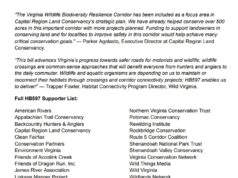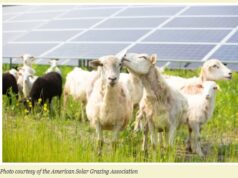by Glen Besa
Blue Virginia’s Jan 26 piece ‘Two Plastics “Chemical Recycling” Bills in the VA General Assembly Represent Step Backwards for Our Climate, Public Health, and Environmental Justice Goals’ blows the whistle on industry legislation that purports to recycle plastic but in reality would create loopholes in our environmental laws for new major polluter.
The initial progress of this legislation, HB 2173 (Plum) and SB 1164 (Hanger) was and is alarming. HB2173 was on Third and Final Reader on the House floor before environmentalists picked up the scent and alerted allies in the House Democratic Caucus who managed to get the bill re-referred to the House Agriculture, Chesapeake and Natural Resources committee where it died. Ag Committee Chair Plum, who had patroned the bill, is now seeking a study of the technology over the next year which could be helpful in sorting out truth from fiction as to this technology. On the other hand, the Senate over strong objections of environmentalists passed SB1164 by a 34-4 margin, with only Senators Favola, Hashmi, Locke, and McClellan voting in opposition. SB1164 goes to the House Agriculture committee this week where it is hoped the bill will encounter the same fate as HB2173.
“Chemical recycling,” “Advanced Recycling,” or “plastics to fuel” technology is seeing a major lobbying push by the American Chemistry Council (aka the plastics industry) in numerous states. To advance this unproven industry, plastic lobbyists are attempting to exempt the facilities from the stricter siting regulations of solid waste management facilities and to reclassify post consumer plastic as not solid waste if used in pyrolysis or gasification. HB2173 and SB1164 would create both these loopholes in existing state law.
Nor is this the first attempt in Virginia by plastics industry lobbyists to pave the way for “chemical recycling”. In the 2020 General Assembly Session, Senators Hanger and Lewis secured the passage of legislation (SB590) that granted equipment used in “advance recycling” a sales tax exemption and a lower personal property tax rate.
With tax breaks in hand and a compliant VA DEQ that has failed in notify the industry that it will require a “solid waste management facility” permit, the Northam Administration has embraced this technology issuing a June 2, 2020 press release announcing Braven Environmental’s first such pyrolysis plastics recycling facility in Virginia proposed for Cumberland County.
While there is much talk of environmental justice these days within the Northam Administration, this “chemical recycling” plant is slated for Cumberland County, a small rural county that has a more than 30% African American population, and which is already slated for a new mega landfill actively opposed by the community. The pending air pollution application for this pyrolysis facility proposed by Braven Environmental seeks to avoid a public hearing and even public notice of its air pollution permit. If DEQ issues the permit, the neighboring community and all those down wind would be exposed to substantial Hazardous Air Pollutant (HAP) emissions including:
- 43.4 lbs of lead/year
- 58 lbs of arsenic/year
- 1,450 lbs of Manganese
- 14.5 lbs of Mercury/year
- 348 lbs/year of formaldehyde
- 4.64 tons per year of benzene
- 7.54 tons per year of naphthalene
- 54.665 tons per year of toluene
- 25.25 tons per year of hexane
In testimony before the General Assembly in support of the legislation and the industry, Brett A. Vassey, President & CEO of the Virginia Manufacturers Association, enthusiastically noted that we could see five or more of these facilities developed across Virginia.
This “chemical recycling” of plastics is the industry’s latest effort to convince the public that the mounting toll of plastic litter and micro plastics in the environment and in our food can be solved by a technological fix. The technological promise of chemical recycling is sketchy at best but the “greenwashing” hype by the plastics industry is intended to mislead legislators and the public to believe that this is the silver bullet to the plastics problem.
It would appear that the Northam Administration believes the hype. As reported in industry publication Plastics Today:
Virginia Governor Ralph Northam announced on June 2, 2020, that Braven Environmental, a company that uses pyrolysis technology to derive fuel from landfill-bound plastic, will invest $31.7 million to establish a manufacturing operation in Cumberland County. Virginia successfully competed with North Carolina and South Carolina for the project.
Northam boasted of the “well-paid job opportunities” for the citizens of Cumberland County and the company’s contribution to lessening Virginia’s environmental footprint. Braven received a $150,000 grant from the Commonwealth Opportunity Fund to assist Cumberland County with the project. The Virginia Tobacco Region revitalization commission approved $65,000 in Tobacco Region Opportunity Funds for the project, and funding and services to support the company’s employee training activities will be provided through the Virginia Jobs Investment Program. Braven plans to create a total of over 80 new jobs within 18 months of the first phase of this project.
Assuming the environmental community succeeds in stopping SB1164 and the state agrees to study this technology, we just may have a chance to fully understand the environmental, environmental justice and economic implications of this technology before we build any of these facilities in Virginia.
A few commonsense questions about the technology that need answers include:
- How much plastic and other useable materials are actually recovered per ton of plastic waste processed?
- What are the climate impacts of pyrolysis in terms of a net increase in CO2 and other greenhouse gases generated and released from this process?
- Considering the truck traffic, noise, litter, odors and air pollution associated with this waste processing facility, why should it be exempt from the solid waste management facility permitting requirements?
- What are the environmental justice considerations that should go into the siting of such facilities once the air pollution and other impacts are better understood?
- How successful have similar facilities been at staying within the toxic air emission limits of their air pollution permit?
If we get a study, these questions and more need to be addressed in a transparent process that includes community members and representatives of the environmental community in addition to industry.


![Video: Ivy Main Says “the hostility to offshore wind is really just [Trump]; nobody else feels this way…he will be gone and then we will get back on track”](https://bluevirginia.us/wp-content/uploads/2026/02/axiosivymain-238x178.jpg)









![Friday News: “As Trump Weighs Iran Strikes, He Declines to Make Clear Case for Why, or Why Now”; “A former prince is arrested in the UK with accountability in question in the US”; “MAGA’s Newest Enemy [Abigail Spanberger] to Give State of the Union Rebuttal”](https://bluevirginia.us/wp-content/uploads/2026/02/montage0220-100x75.jpg)